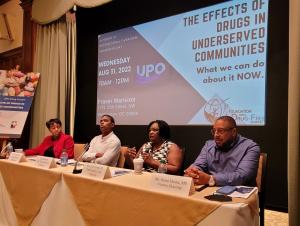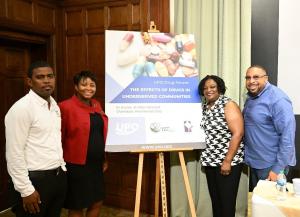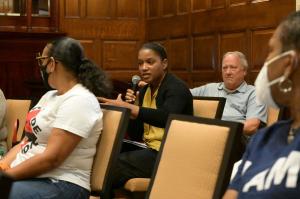Conference held on why underserved communities seem to have more drug problems than other areas and what can be done

Panel of experts talking about the overdose crisis: Tina Whitlow, Dr. Warees Majeed, Gail Avent, and Daren Hester (l-r) all discussing hopelessness at the root of drug abuse. Gail Avent Director Total Family Care speaking.

Daren Hester, Victory Housing and a Veteran Marine, pointing out that low-income housing, while needed, creates a shared feeling of hopelessness in the community.
In honor of International Overdose Awareness Day, United Planning Organization, Drug-Free World, and community groups discussed solutions
On International Overdose Awareness Day, community leaders in Washington, DC, met at the Church of Scientology’s National Affairs Office to discuss this and how the community can work together to address the issues involved.
The need for drug education and personal mentoring was talked about by all speakers at the event. Underserved communities are suffering from drugs being the “solution” that many are turning to in dealing with hopelessness and life obstacles.
The speakers addressed the causes of drug addiction and using drugs like fentanyl. All agreed that a feeling of hopelessness lies behind most of the drug use.
The event sponsor, Tina Whitlow, United Planning Organization’s Community Outreach Specialist, explained, “The concentration of drugs in the community comes from abuse, neglect, single parent homes, and hopelessness in many poorer communities.”
Thalia Ghiglia, faith liaison for the Foundation for a Drug-Free World, opened the event by explaining some issues related to the drugs themselves. She explained the sudden increase in fentanyl, which is a synthetic chemical created in labs that is fairly easy to produce and can be made anywhere in the world. Cocaine is plant-based and thus harder to produce as there are weather, farming, greater government interdiction, and transportation involved. Ms. Ghiglia pointed that out the ease of production and transportation of fentanyl is driving today’s overdose epidemic. Statistics show that 90% of opioid overdose deaths involve fentanyl.
Daren Hester, Vice President at Victory Housing, and a Veteran Marine, has worked in property management for twenty years. His extensive knowledge in multifamily house, public housing, senior housing, and low-income tax credit housing has given him insight into the issues in public housing. He said, “Public housing is designed to concentrate a low-income group. What happens is a sense of hopelessness. Residents then self-medicate. It destroys the family. The children are the ones who really suffer.”
Gail Avent, Director of Total Family Care Coalition, said, “It takes a village to be a parent.” She urged stakeholders and nonprofits to encourage parents to “be the best person they can be” and to help parents to overcome hopelessness and strive to better their own and their children’s lives.
Dr. Warees Majeed, entrepreneur and community leader, brought home the consensus of the speakers when he talked about the need for personal outreach and understanding. He lost four friends to fentanyl during the pandemic. Pointing out how readily available and accessible drugs are, Dr. Majeed urged all attendees to reach out to others: “How many individuals have you talked to? Challenge yourself – are you mentoring someone?”
In wrapping up the International Overdose Awareness Day, Dr. Majeed continued to point to hopelessness leading to drug use and other problems. He stated, “A lot of violence started with people who start on drugs.” He urged more involvement in other’s lives and not being afraid to reach out and help a neighbor, mentor a child, provide drug education to a parent, and especially to offer hope.
Ms. Gail Avent made the problem very real: “The kids become the parents because Mom is drunk or nodding off (from drugs).” She pled with the audience to get involved and help families to overcome drugs and become a positive force to help kids.
The sponsor of the event, United Planning Organization, was founded in 1965 as a community action agency dedicated to helping Washington, DC, residents with low incomes find their ways to becoming self-sufficient.
One of the event organizers, the Foundation for a Drug-Free World is a nonprofit that empowers youth and adults with factual information about drugs so they can make informed decisions and live drug-free. Through a worldwide network of volunteers, 50 million drug prevention booklets have been distributed, tens of thousands of drug awareness events have been held in some 180 countries and Truth About Drugs public service announcements have been aired on more than 500 television stations. For well over a decade, these materials and activities have helped people learn about the destructive effects of drugs and thereby make the decision for themselves to not use them. These educational materials are free and can be ordered at www.drugfreeworld.org.
Thalia Ghiglia
Drug-Free World
+1 202-667-6404
email us here
Legal Disclaimer:
EIN Presswire provides this news content "as is" without warranty of any kind. We do not accept any responsibility or liability for the accuracy, content, images, videos, licenses, completeness, legality, or reliability of the information contained in this article. If you have any complaints or copyright issues related to this article, kindly contact the author above.


